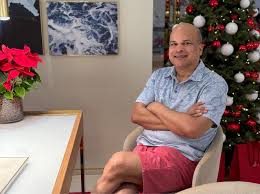-By Special Political Correspondent

(Lanka-e-News -20.April.2025, 11.20 PM) A potentially explosive revelation has emerged surrounding the still-haunting Easter Sunday attacks of 2019—one that threatens to entangle international non-governmental operations with the murky undercurrents of Sri Lankan security and politics.
Asanka Abeygunasekara, the former Director General of the Sri Lankan Defence Intelligence Agency, has penned a formal letter to President Anura Kumara Dissanayake dated April 18, 2025. In it, he calls for an immediate investigation into a Colombo-based think tank known as the Pathfinder Foundation—an organisation with reputed links to Milinda Moragoda, a former diplomat with longstanding ties to both Washington and New Delhi.
Abeygunasekara’s letter alleges that Pathfinder had a “covert background role” in the events surrounding the Easter Sunday bombings. He further claims that Suresh Saleh—now widely suspected by various quarters of playing a role in the attacks—is currently employed by none other than Pathfinder.
The accusation is as bold as it is unsettling.
The name Pathfinder stirred another memory—of a May 7, 2019 conference held at the Bandaranaike Memorial International Conference Hall in Colombo, organised under the title: “The Impact of US Foreign Policy on China, South Asia, and Sri Lanka.” This event took place just weeks after the Easter carnage and was hosted by the same Pathfinder Foundation.
The keynote speaker? Former US Ambassador to Sri Lanka, Robert O. Blake.
Blake, in an address that raised more than a few diplomatic eyebrows, repeatedly lavished praise on Gotabaya Rajapaksa, Sri Lanka’s former Defence Secretary and future President, crediting him with personally ridding the country of terrorist threats. Blake went as far as to suggest that a specialised counterterrorism unit be re-established under Gotabaya’s leadership—echoing rhetoric that seemed tailor-made to rehabilitate Rajapaksa’s post-war image and prime him for electoral victory.
“This is a man who personally intervened during the war to fulfil his responsibilities,” Blake declared with the finality of an endorsement speech, not a foreign service commentary.
And so it was. Within months, Gotabaya emerged from the shadows of the Easter ashes to claim his place as Presidential frontrunner. His campaign narrative, almost operatic in its timing, asked a simple question with Machiavellian flair: “Who pulled the trigger?”—all while the smoke was still in the air.
Fast forward to April 5, 2025: Indian Prime Minister Narendra Modi arrived in Sri Lanka, with eight bilateral agreements poised for signature. In preparation, Milinda Moragoda’s Pathfinder Foundation hosted a two-day workshop with the Indian Ministry of External Affairs—a meeting of minds with more than mere policy implications.
In a country where sovereignty is often traded for survival, Moragoda’s name has long floated in the speculative ether as a shadowy figure—less diplomat, more dealmaker. But it’s not just Abeygunasekara who has sounded the alarm.
Enter Professor Rohan Gunaratna, self-styled terrorism analyst, who, in the immediate aftermath of the 2019 bombings, became the go-to commentator on “Islamist extremism.” From the moment of the attack, Gunaratna worked tirelessly to shift all attention onto Zaharan Hashim and his clique, leaving untouched the deeper political conspiracies that have since begun to surface.
Gunaratna’s unwavering defence of Moragoda—against Abeygunasekara’s charges—now seems part of a broader effort to sanitise Sri Lanka’s security narrative, to keep the puppet strings hidden even as the marionettes dance on stage.
Indeed, the role of Pathfinder appears increasingly dubious. Not merely a think tank, it has evolved into a soft-power machine—managing the narratives of power transitions and shaping international opinion. At home, its ideological twin, the Ulpotha Foundation, champions a brand of cultural nationalism designed to mask geopolitical ambitions in the language of heritage and identity.
The real question is not simply whether Milinda Moragoda’s Pathfinder Foundation had prior knowledge or indirect involvement in the Easter Sunday attacks. The deeper concern is whether it served as an intellectual laundromat—a platform for legitimising authoritarian actors in the guise of counterterrorism and national security.
As the NPP government finds itself at a crossroads—facing pressure both from domestic critics and an increasingly inquisitive international community—it must now confront the question that has loomed for half a decade:
In Sri Lanka, the truth, like justice, often arrives late—if at all. But as Abeygunasekara’s letter makes its way through the corridors of power, it may yet open doors long bolted shut. And behind them, the faces of those who profited from panic and curated chaos may finally be illuminated.
-By Special Political Correspondent
---------------------------
by (2025-04-20 18:12:45)
Leave a Reply